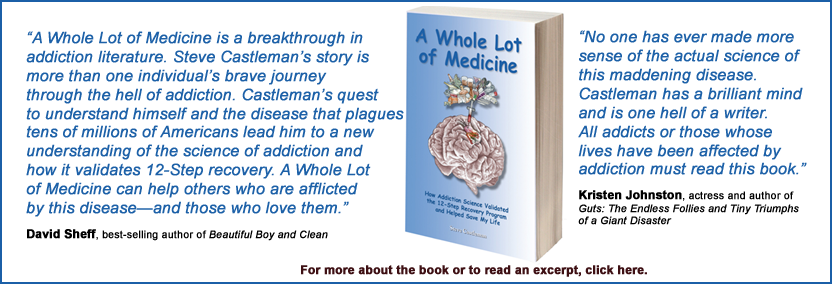Gratitude: For a Drunk Jewish Dancer
“So I bet you thought Jews couldn’t be alcoholics, huh?”
These were the first words I recall from a doctor I didn’t want to talk to at a rehab I didn’t want to be in.
Whatever I was expecting him to say, this wasn’t it. But before I could react he continued, “Well, I’m here to tell you Jews can be just as alcoholic as anybody, because I’m a Jewish alcoholic …”
I thought, Did he really just tell me he’s an alcoholic? This Jewish-alcoholic stuff was a revelation and role reversal I couldn’t grasp. He was confessing his addictionto me? Why is he telling me this shit? I got an immediate answer.
“… and so are you.”
This cut through the cranial fog of detox and got my attention. It was his tone that did it, so matter-of-fact that for the first time linking me and alcoholism didn’t sound like an indictment. He was Sergeant Joe Friday stating an obvious truth, leaving no room for contradiction.
Still, I disputed the diagnosis and told the doc, whom I’ll call Bobby, I’d be fine if everyone just left me alone. OK, I screwed up by drinking too much, maybe even a lot too much, but there was no way was I an alcoholic.
That’s when Bobby reported my blood-alcohol on admission: .413, more than five times the drunk-driving limit. “Next time you drink like that,” he warned, “you’re gonna die, it’s as simple as that.”
I couldn’t help but think of the old blues tune, “Cocaine.” “Doc says it’ll kill me, but he don’t say when …” Here was a doc telling me exactly when.
“Anyone who drinks himself past point-four-O and survives it has the kind of tolerance only an alcoholic has.” He paused for a second to let it sink in and then offered a tiny ray of hope. “You don’t have to live like this, you know.”
“Whadaya mean?”
“There’s life after alcohol.”
I didn’t believe him, not one tiny bit. But I was to learn through years of struggle, setbacks and small victories that I’d been nearly-dead wrong.
How did Bobby find the way to get through to me at that pivotal moment?
As a kid, he explained, he’d seen his granddad pass out in his chair every night. But Grampa wasn’t a drunk, his parents assured him, “Jews couldn’t be alcoholics.” Bobby believed them, with disastrous results until he was forced to get sober at the “frisky farm for fucked-up physicians,” as he put it, to save his life and license. He often encountered this notion with Jewish addicts and tailored his approach accordingly when I was poured into his care.
That was eighteen years ago and since then I’ve learned to live sober, at least so far.
I’ve learned sobriety doesn’t eradicate all problems. To be successful at it, you have to retrain your mind, changing your thought process so you can endure any challenge without a chemical solution. While I sometimes still despair at life’s futility and my limited impact on even my own little world, I don’t have to drink like I used to because I don’t have to think like I used to.
Instead of succumbing to hopelessness, I can remind myself to be grateful for Bobby’s grandfather. How, drunk in his chair, he must have lamented his weakness and helplessness, the very things I thought back when I was drunk in my chair and now suppose sober as I sink into the psychological abyss from time to time.
Bobby’s grampa couldn’t foresee that his drunkenness would help save my life decades later. That even our failings can have constructive consequences we can’t imagine.
Life isn’t a Frank Capra movie. We don’t get to see how the world is better for our having been here. We have to have faith our lives have positive impacts we can never envision. As Jackson Browne put it in For a Dancer:
Into a dancer you have grown
From a seed somebody else has thrown
Go on ahead and throw some seeds of your own
And somewhere between the time
You arrive and the time you go
May lie a reason you were alive
But you’ll never know.
I picture Bobby’s grandfather and hope I may have started a ripple in history that will have positive effects, akin to his impact on my life. And I pray for more complete acceptance I can never know what they’ll be.
This post is an edited excerpt from, A Whole Lot of Medicine, now available at Amazon.com.



Thanks for this story – it’s touching. I also thought practising gratitude was bullshit, but it was because I expected a major shift in feeling. The shift has been more subtle than I expected, but still worthwhile.
Thank you for your kind words about the post.